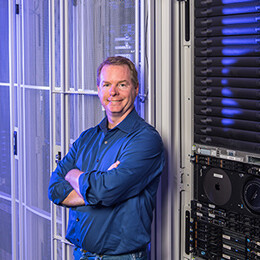Andresen named next computer science department head
Tuesday, April 8, 2025

Daniel Andresen, director of Kansas State University's Institute for Computational Research in Engineering and Science, Michelle Munson-Serban Simu keystone research scholar and professor of computer science, has been named head of K-State's computer science department, effective June 23.
The announcement was made by Matt O'Keefe, dean of the Carl R. Ice College of Engineering, after a national search. Andresen will replace Scott DeLoach, professor of computer science, who plans to retire in June.
"I am confident Daniel will do a fantastic job leading the computer science department," O'Keefe said. "His experience directly managing K-State's high-performing computing cluster, Beocat, makes him a fantastic fit for this role. I'm excited to see the department continue to innovate as our society moves toward AI and its integration into our everyday lives."
Andresen joined the faculty as an assistant professor in 1997 and has worked in the computer science department for 28 years. He was promoted to associate professor in 2003 and full professor in 2015. He has been directing the Institute for Computation Research in Engineering and Science, which manages Beocat, since 2011. Andresen has also served as a consultant and program director for the Division of Computer and Network Systems at the National Science Foundation.
He double majored in computer science and mathematics at Westmont College, graduating in 1990 before earning his master's in computer science from California Polytechnic State University in 1992. He studied at the University of California, Santa Barbara, for his doctorate, completing the degree in 1997 before joining the faculty at K-State the same year.
Andresen's research focuses on distributed systems, ranging from sensor networks monitoring bovine health levels to high-performance computing systems. He has worked to build the cyberinfrastructure foundation to allow K-State to successfully compete at the national level, growing Beocat from four machines and 14 cores to its current position as one of the largest academic supercomputers in the state of Kansas, with more than 350 machines and 10,000 cores.